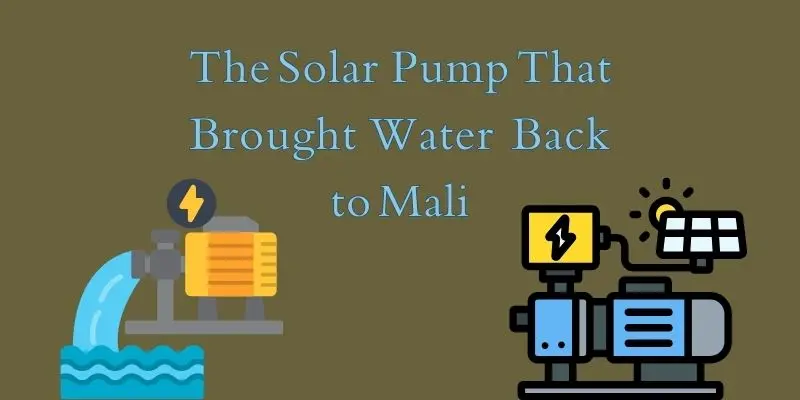The Solar Pump That Brought Water Back to Mali
Published: 20 Apr 2025
In the heart of Mali’s Mopti Region, where agriculture is not just a livelihood but a way of life, years of climate change have taken a devastating toll. Once-fertile lands were reduced to cracked earth. Rainfall became erratic. Rivers and wells dried up. For the people of Mopti—especially the women—access to water became a daily struggle, and farming, their primary source of income, seemed like a fading dream One of those women was Aïcha Doumbia, a 38-year-old widow and mother of three. Her story reflects the quiet resilience of countless smallholder farmers across West Africa.

“We used to feed our families from our own soil,” she says. “But when the rain stopped, so did everything else.”
She would wake before sunrise and walk two hours to reach a hand-dug well, fill buckets, and carry them back on her head—just to keep a few plants alive. Despite the effort, her crops failed season after season.
Her land was dry, her income gone, and her children hungry.
Solar-Powered Irrigation
In 2021, hope arrived in the form of a solar-powered water pump—part of a rural resilience project initiated by a local NGO and supported by international climate adaptation funds. The goal was to introduce sustainable, climate-smart agriculture using renewable energy, especially for women farmers disproportionately affected by water scarcity.

Aïcha, along with a group of 12 other women, received training on how to install, operate, and maintain a solar irrigation system. The system included:
- A set of solar panels that powered
- A submersible pump drawing groundwater
- Connected to a drip irrigation network laid across their communal plot
No fuel. No ongoing electricity costs. No emissions. Just clean, abundant sunlight turned into water.
The Transformation on the Ground
In a matter of weeks, Aïcha’s once-parched land began to bloom. Her tomatoes and onions flourished even in the dry season. Her children no longer missed school to help carry water or look for food. By the end of the season, she had tripled her previous yield and, for the first time in years, earned enough to:
- Buy a bicycle for transporting her vegetables to the market
- Afford school fees for her youngest son
- Start saving for building a proper shelter for her family
“The sun used to burn our hopes,” she says with a proud smile. “Now, it gives us the water we need to grow again.”
From Survival to Leadership
The impact went beyond Aïcha’s farm. The group of women formed a cooperative, managing the solar irrigation system together and sharing responsibilities. The system was so successful that surrounding villages took notice. Aïcha became a mentor, teaching other women how to use the technology, grow high-value crops, and manage their own money.
This wasn’t just a solution for farming. It was a revolution in gender empowerment.
They began growing onions, lettuce, tomatoes, and okra—crops they could sell year-round at local markets. Income improved. Dignity returned. Families that once relied on food aid were now running profitable farms.
Scaling the Impact Across Mali
Aïcha’s village is not alone. Across Mali and the broader Sahel region, over 15,000 smallholder farmers have gained access to solar irrigation systems, thanks to similar partnerships between NGOs, governments, and climate innovation networks.
The benefits are wide-reaching:
- No fuel dependency – fully powered by the sun
- Water efficiency – drip irrigation reduces waste
- Low maintenance – locals trained for repairs
- Climate resilience – enables year-round farming
- Women’s empowerment – putting tools in women’s hands
These systems have become lifelines—not just to improve productivity, but to preserve communities at the frontlines of climate change.
What Makes This Story So Powerful?
It’s not just about the technology. It’s about access. It’s about bringing innovation to the very people most vulnerable to environmental change and economic marginalization—and watching them thrive.
“When you give water, you give life,” Aïcha says.
“But when you give a woman the power to bring her own water—you change everything.”
Final Thoughts
The story of Aïcha Doumbia is just one of many. But it shows what’s possible when agricultural innovation meets human determination.
Solar irrigation isn’t just a tool—it’s a symbol of resilience, of hope, and of a future where even in the driest places, something beautiful can grow.
References
Solar-powered water pumps offer a clean, sustainable, and cost-effective solution for irrigation in remote areas, where grid electricity is unavailable and diesel fuel is expensive or unreliable.
Author Name
Mitato ,Simon
Solar Water Pumping System
Official report

- Be Respectful
- Stay Relevant
- Stay Positive
- True Feedback
- Encourage Discussion
- Avoid Spamming
- No Fake News
- Don't Copy-Paste
- No Personal Attacks

- Be Respectful
- Stay Relevant
- Stay Positive
- True Feedback
- Encourage Discussion
- Avoid Spamming
- No Fake News
- Don't Copy-Paste
- No Personal Attacks





